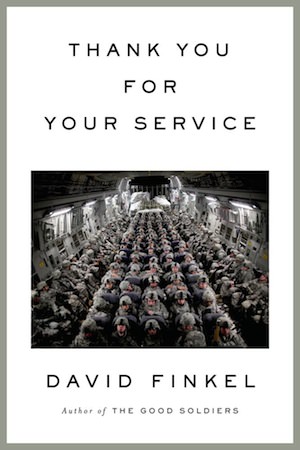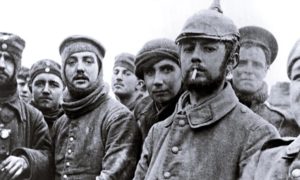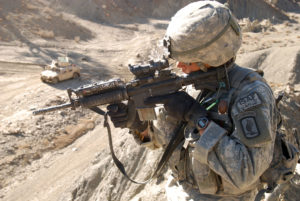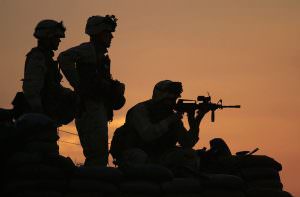Thank You for Your Service
We've got too much war for too few warriors. David Finkel, in painful, intimate detail, examines the effects of "after war" and those victimized by egregious military malpractice.Author David Finkel, in painful, intimate detail, examines the effects of "after war" and those victimized by egregious military malpractice.
“Thank You for Your Service” A book by David Finkel
Nominally a sequel to “The Good Soldiers,” his 2009 account of an American infantry battalion at war in Iraq, David Finkel’s new book actually serves as a perfect companion to George Packer’s recent best-seller, “The Unwinding.” Like Packer, Finkel examines the human detritus left in the wake of fraudulent promises and collapsed illusions. In “The Unwinding,” Packer contemplates the fate of those victimized by cataclysmic economic change. In “Thank You for Your Service,” Finkel looks at those victimized by egregious military malpractice.
The post-industrial, high-tech, information-age economy unveiled near the end of the 20th century supposedly offered a template for permanent prosperity. The Great Recession upended such expectations. Although some Americans have gotten very rich indeed, far larger numbers of ordinary citizens find themselves unemployed and unemployable. With impressive sensitivity, Packer told their story.
Concocted at about the same time, a post-industrial, high-tech, information-age approach to waging war supposedly offered a template for assured victory. Iraq and Afghanistan have shredded such pretensions. Although some high-ranking military and civilian officials found ways to cash in, far larger numbers of ordinary soldiers (and their families) suffered, many of them grievously. In painful, intimate and at times almost voyeuristic detail, Finkel tells their story.
More specifically, Finkel, a reporter with The Washington Post, attends to what he calls the “after war.” His concern is with the soldiers who return from the war zone bearing wounds — and with the loved ones on whom those wounds also become imprinted. Above all, he is concerned with wounds that may not be fully visible — the roughly half-million younger veterans suffering from post-traumatic stress disorder (PTSD), traumatic brain injury or related conditions. Make that a half-million and counting.
To translate this disturbing statistic into flesh and blood, Finkel checks in on some of the soldiers featured in his previous book. What he finds is anger, anxiety, shame, depression, guilt, sleeplessness, self-abuse, spousal abuse, child abuse, alcohol abuse, drug abuse and suicidal tendencies, sometimes acted on, sometimes not. Shouting matches, crying jags and bizarre behavior along with guns and two-pack-a-day smoking habits abound, but not much in the way of useful therapy. Of one soldier Finkel writes, “He began to take sleeping pills to fall asleep and another kind of pill to get back to sleep when he woke up. He took other pills, too, some for pain, others for anxiety. He began to drink so much vodka that his skin smelled of it, and then he started mentioning suicide.”
Apart from an astonishing facility for prescribing medication — one of Finkel’s protagonists is “taking forty-three pills a day for pain, for anxiety, for depression, for nightmares” — the army has made little apparent headway in caring for this torrent of tormented souls. To judge from Finkel’s description, assistance rendered has been erratic, bureaucratic and ineffective, with soldiers not so much treated as processed. Just gaining entrance into one of the army’s Warrior Transition Battalions (WTB) a troubled soldier needs to collect 39 separate sets of initials from 39 different offices, not all of them adequately staffed or open for business. As a further prerequisite for admission, soldiers must sign a “Contract for Safety.” Apparently assuming that the persons signing the contract are coherent, rational and in full command of their faculties, the text reads in part, “I will not intentionally harm myself or others and if I have thoughts about harming myself or others I will contact my Chain of Command immediately.”It isn’t quite that simple. Finkel writes that one soldier who upon admission into a WTB duly “met with a case manager, the chaplain, the pharmacist.” Procedurally, the right people were all on the case. “He got occasional counseling and was prescribed the twelve medications that would be mentioned in the post-suicide medical report. He also attended suicide awareness training and was given a laminated card on how to recognize the signs of suicidal behavior, which was found tucked into his wallet after he was pronounced dead.
An institution designed to dole out death and destruction possesses little inherent aptitude for dealing with severe psychological or emotional distress. Why should we be surprised? Testifying to that lack of aptitude, the number of soldiers taking their own lives has reached epidemic proportions. Back in Washington, Gen. Peter Chiarelli, the army’s second most senior officer, made it his personal mission to stem this epidemic. Here was a problem that was going to get sustained four-star attention. Yet Finkel’s characterization of the general’s ensuing campaign illustrates the difficulty the army faces in grappling with the problems of “after war.”
Chiarelli’s innovation was to require detailed accountability for every soldier-suicide. He made it his business to find out what happened and why. In regularly scheduled videoconferences, he pressed commanders not only to explain specific incidents, but also to identify “lessons learned” for broader application.
Charged with explaining the inexplicable, nervous subordinates try their best to make the boss happy. They submit lengthy reports. They document attendance at suicide awareness training. They confirm that the deceased had received the requisite laminated cards. When preparing for Chiarelli’s show-and-tell, they fret over the appearance of their briefing slides, hoping that form might conceal the absence of serious content. In place of solutions, they offer bromides. “Increase suicide prevention classes,” they suggest. “Continue improvements in leader communication.” “Encourage the use of a battle buddy among warriors.” In effect, try harder. Chiarelli retired in 2012, having come nowhere close to accomplishing his self-assigned mission. Credit him for wanting to do the right thing. But as Finkel makes abundantly clear, between intentions and outcomes a yawning gap exists.
Readers of “Thank You for Your Service” might wonder if Chiarelli and the rest of his fellow generals have been barking up the wrong tree. Rather than trying to exorcise the demons that beset individual soldiers, senior officers would do well to focus on a prior question: Where exactly do the demons come from? As if in passing, Finkel offers one plausible explanation. “Soldiers with repeated deployments are more likely to commit suicide.”
So why does the Pentagon order soldiers to return to combat zones again and again with so little time to recover and recuperate between deployments? The answer is clear: Because a relatively small army configured to fight short wars that it confidently expected to win has found itself fighting interminably long, unwinnable wars. Do the math. We’ve got too much war for too few warriors.
Reducing the incidence of PTSD and suicide among the soldiers they profess to care about will require of general officers two things. First, they will need to recover their ability to achieve prompt and conclusive victory in wars that absolutely must be fought. Second, they will need to do a better job of persuading their political masters to avoid needless wars that can’t be won. It’s what generals exist to do: achieve battlefield success and provide cogent advice to policymakers.In recent years, of course, senior military leaders have manifestly fallen short on both counts, with soldiers paying the price for their failure. Should that failure persist — should our too-small army once again become mired in a too-long war — then only a single option will remain for easing the burden on U. S. troops. That option will entail expanding the force, inviting the American people to share in the sacrifices currently exacted of only the few volunteering to serve.
That, too, would constitute an admission of failure to which American generals have contributed. That failure finds expression in a deeply perverse and thoroughly dishonest relationship between soldiers and society. The hackneyed phrase providing a title for Finkel’s fine book exquisitely captures the hypocrisy pervading that relationship. The travails of those whose suffering he recounts give us a glimpse of the costs incurred and of who pays them.
Andrew Bacevich teaches at Boston University. His new book is “Breach of Trust: How Americans Failed Their Soldiers and Their Country.”
©2013, Washington Post Book World Service/Washington Post Writers Group
Your support matters…Independent journalism is under threat and overshadowed by heavily funded mainstream media.
You can help level the playing field. Become a member.
Your tax-deductible contribution keeps us digging beneath the headlines to give you thought-provoking, investigative reporting and analysis that unearths what's really happening- without compromise.
Give today to support our courageous, independent journalists.






You need to be a supporter to comment.
There are currently no responses to this article.
Be the first to respond.